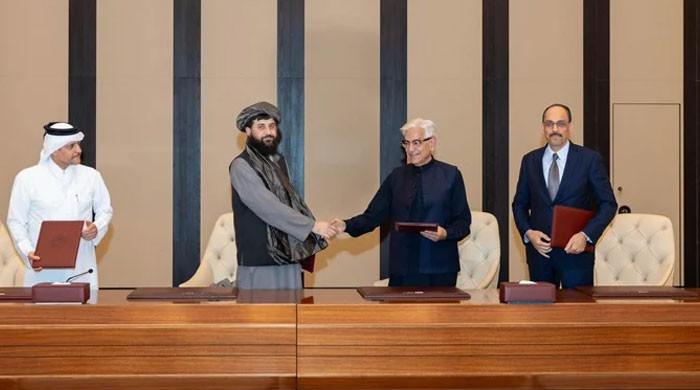
Saudi Arabia Welcomes Ceasefire Agreement Between Pakistan and Afghanistan: A Step Towards Regional Stability
In a significant diplomatic development, Saudi Arabia has expressed its approval of the recent ceasefire agreement reached between Pakistan and Afghanistan. This agreement, finalized on October 18, 2025, during discussions in Doha, Qatar, marks a crucial step towards enhancing stability in a region long plagued by conflict. The commitment to peace was solidified by a handshake between Pakistani Defense Minister Khawaja Asif and his Afghan counterpart, Mullah Yaqoob, reflecting a mutual desire to end hostilities and foster a cooperative relationship.
Context of the Ceasefire Agreement
The ceasefire agreement comes amid ongoing tensions and sporadic violence along the Pakistan-Afghanistan border. Both countries have faced significant challenges, including terrorism, political instability, and humanitarian crises. The involvement of the Taliban regime in Afghanistan and various militant factions in Pakistan has complicated the peace process, making this ceasefire a pivotal moment in regional diplomacy.
Saudi Arabia's endorsement of the ceasefire highlights its role as a key mediator in the region. Known for its diplomatic efforts, the Kingdom has been keen on promoting peace initiatives that can lead to lasting stability in South Asia and the broader Middle East. The ceasefire agreement not only aims to reduce violence but also sets the stage for future negotiations on more comprehensive peace talks.
The Role of Saudi Arabia in Regional Diplomacy
Saudi Arabia has a long-standing interest in maintaining peace within the region. Historically, it has played a crucial role in mediating conflicts, promoting dialogue, and providing humanitarian assistance. The Kingdom's involvement in the ceasefire agreement underscores its commitment to stability in Pakistan and Afghanistan, recognizing the interlinked fates of these neighboring countries.
The Saudi government has been proactive in fostering relationships with both Islamabad and Kabul, understanding that a peaceful South Asia is essential for regional development. The Kingdom's strategic partnerships with both nations allow it to act as a neutral facilitator, bridging the gaps between conflicting parties.
Implications of the Ceasefire
The ceasefire agreement carries several important implications for the region:
1. Reduction in Violence
The immediate benefit of the ceasefire is the expected decrease in violence along the border. This is crucial for civilian safety and can pave the way for humanitarian assistance to reach those in need, particularly in areas affected by conflict.
2. Economic Opportunities
With a reduction in hostilities, both Pakistan and Afghanistan can focus on economic cooperation. Trade and investment opportunities can flourish, benefiting both nations and contributing to regional growth.
3. Strengthening Bilateral Relations
The ceasefire serves as a foundation for improving bilateral relations between Pakistan and Afghanistan. Continued dialogue and cooperation can lead to long-term peace and stability, enhancing trust and collaboration in various sectors.
4. Regional Stability
A peaceful resolution to the tensions between Pakistan and Afghanistan can have a ripple effect throughout the region. Stability in these countries could contribute to broader security in South Asia, reducing the risk of external interventions and conflicts.
Future Prospects
While the ceasefire is a promising development, it is essential for both nations to remain committed to the terms of the agreement. Ongoing dialogue and negotiations will be crucial in addressing underlying issues and ensuring that the ceasefire leads to a sustainable peace process.
International support, including from countries like Saudi Arabia, will be vital in facilitating these discussions. The Kingdom's diplomatic influence can help guide Pakistan and Afghanistan towards a more stable future.
Conclusion
The ceasefire agreement between Pakistan and Afghanistan, welcomed by Saudi Arabia, represents a hopeful step towards peace and stability in a region that has faced decades of turmoil. As both nations work to uphold the terms of the agreement, the support of international partners will be crucial in fostering an environment conducive to lasting peace. With continued commitment from all parties involved, there is potential for a brighter future for the people of Pakistan and Afghanistan.
---
FAQs
1. What led to the ceasefire agreement between Pakistan and Afghanistan?
The ceasefire agreement was a response to ongoing tensions and violence along the border, aimed at reducing hostilities and fostering a cooperative relationship between the two countries.
2. How does Saudi Arabia play a role in this ceasefire?
Saudi Arabia has acted as a mediator and supporter of peace initiatives in the region, leveraging its diplomatic ties with both Pakistan and Afghanistan to facilitate the ceasefire agreement.
3. What are the potential benefits of the ceasefire?
The ceasefire could lead to a reduction in violence, economic opportunities for both nations, strengthened bilateral relations, and greater regional stability.
4. What are the next steps following the ceasefire agreement?
Both countries must remain committed to the terms of the ceasefire and engage in ongoing dialogue to address underlying issues, with the support of international partners like Saudi Arabia.
5. Can the ceasefire lead to a lasting peace?
While the ceasefire is a positive development, achieving lasting peace will require continued commitment, dialogue, and cooperation from both Pakistan and Afghanistan, along with international support.
Tags
National
